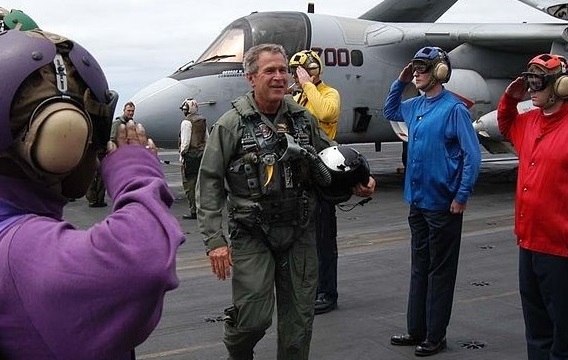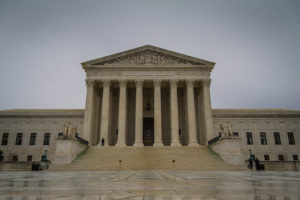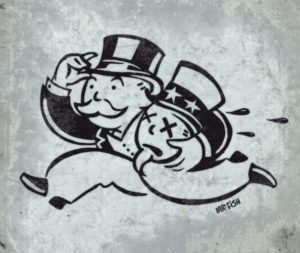American History for Truthdiggers: Bush II and the Birth of Forever War
The 43rd president—besides leaving the domestic economy in ruins—bequeathed a disastrous foreign policy. President George W. Bush on the USS Abraham Lincoln in 2003 just before he gave a speech marking the end of major combat operations in the invasion of Iraq. He spoke under a banner that proclaimed "Mission Accomplished." (Photographer's Mate 3rd Class Tyler J. Clements / U.S. Navy)
President George W. Bush on the USS Abraham Lincoln in 2003 just before he gave a speech marking the end of major combat operations in the invasion of Iraq. He spoke under a banner that proclaimed "Mission Accomplished." (Photographer's Mate 3rd Class Tyler J. Clements / U.S. Navy)
Editor’s note: The past is prologue. The stories we tell about ourselves and our forebears inform the sort of country we think we are and help determine public policy. As our current president promises to “make America great again,” this moment is an appropriate time to reconsider our past, look back at various eras of United States history and re-evaluate America’s origins. When, exactly, were we “great”?
Below is the 36th installment of the “American History for Truthdiggers” series, a pull-no-punches appraisal of our shared, if flawed, past. The author of the series, Danny Sjursen, who retired recently as a major in the U.S. Army, served military tours in Iraq and Afghanistan and taught the nation’s checkered, often inspiring past when he was an assistant professor of history at West Point. His war experiences, his scholarship, his skill as a writer and his patriotism illuminate these Truthdig posts.
Part 36 of “American History for Truthdiggers.”
See: Part 1; Part 2; Part 3; Part 4; Part 5; Part 6; Part 7; Part 8; Part 9; Part 10; Part 11; Part 12; Part 13; Part 14; Part 15; Part 16; Part 17; Part 18; Part 19; Part 20; Part 21; Part 22; Part 23; Part 24; Part 25; Part 26; Part 27; Part 28; Part 29; Part 30; Part 31; Part 32; Part 33; Part 34; Part 35.
* * *
George W. Bush’s presidency forever changed the lives of millions at home and around the globe. (I, as a career Army officer, was one of those impacted.) Were it not for him, there would never have been long wars in Iraq and Afghanistan. The profound policy decisions of Bush prove the importance of presidential agency, the power of a single man to forever alter history. It was all rather ironic. Bush had run, in the 2000 election, on a platform of “compassionate conservatism”—a softening, of sorts, of the Republican dogma that had characterized the culture wars of the 1990s. He had even criticized the military interventionism of his predecessor, President Bill Clinton, and eschewed “nation-building” missions around the globe. Yet Bush would be one of the most zealous, and polarizing, conservatives in presidential history and would unleash American military might on an unprecedented scale. On his watch, it can be said without exaggeration, the U.S. shifted from covert to overt imperialism.
So weighty were Bush’s decisions, especially in foreign policy, that even his “liberal” Democrat successor, President Barack Obama, would end up doing little to dismantle the invigorated national security state or lessen the momentum of perpetual war that reigned during Bush’s two terms, from 2001 to 2009. Empire abroad and militarism at home was the new American way. No one, it seemed, could alter that reality. The profound, yet surprisingly effective, cynicism of 21st-century conservatism transformed the political and cultural landscape of the United States. In such a time, Bush was more symptom than cause of America’s ills. Nevertheless, this man and his team of scoundrels demonstrated the contingency of history and the power of individuals’ decisions to drive history in one tragic direction or another. And, to think: Bush’s election would never have occurred if the U.S. had truly been a representative democracy of “one-man, one-vote.”
Election’s Long Detour: Neoconservatives Ascendant
For decades, resurgent Republicans and conservatives of various stripes had trumpeted the importance of localism and states’ rights over federal power. It had long seemed suspicious, a cover for dog-whistle racism and the dismantling of the social safety net. Yet never was the prevailing conservative philosophy shown to be so hypocritical as when five right-leaning Supreme Court justices invoked federal power to hand a presidential election to a like-minded candidate. And that’s exactly what happened over three dozen days at the end of 2000.
George W. Bush—President George H.W. Bush’s son and a former alcoholic turned born-again Christian—had run a dirty campaign in winning a tough GOP primary contest with Sen. John McCain, the prominent Vietnam veteran and former prisoner of war. He would face off with Bill Clinton’s relatively lackluster vice president, Al Gore, in the 2000 general election. They both were privileged men, were from wealthy families and held Ivy League pedigrees. Bush was a legacy and C student at Yale and later attended Harvard Business School before leading a group that bought the Texas Rangers baseball team and eventually becoming governor of Texas. Vice President Gore, a former member of the House and Senate, was the son of a prominent senator from Tennessee and had spent much of his youth in Washington, D.C.
Bush campaigned on standard Republican policies of tax cuts, arguing that the Clinton-era budget surpluses were “not the government’s money” but “the people’s money” and even called for the partial privatization of Social Security. He also advocated drilling for oil in the Arctic National Wildlife Refuge in Alaska. As for foreign policy, he ironically (given his later proclivity for starting wars) criticized Clinton’s use of the military for “nation-building” in Haiti, Bosnia and Somalia. In one debate Bush asserted that he would “be very careful about using our troops as nation-builders. I believe the role of the military is to fight and win war. … I don’t want to be the world’s policeman.” Nevertheless, both he and Gore promised increased defense spending despite the absence of a genuine global threat to U.S. security.
Neither candidate was particularly inspiring. Bush struck many as unsophisticated, uniformed and prone to gaffes. He had proclaimed “Our priorities is faith” and “Families is where our nation finds hope, where wings take dreams.” Gore was portrayed by the media as overconfident and condescending. He was variously described as “stiff,” “wooden” and “pompous.” The Democrat was initially predicted to win in a landslide but squandered his advantages; among other things, he presented an off-putting image by rolling his eyes and audibly sighing during debates. Furthermore, he distanced himself from the incumbent president, fearing—despite Clinton’s 60 percent job approval rating—that the Lewinsky affair and other character questions would taint his campaign. This would be a grave mistake.
In the end, only 55.6 percent of eligible voters turned out. Gore beat Bush by a margin of some 500,000 votes, but due to third-party candidates Ralph Nader of the leftist Green Party and Patrick Buchanan on the right, neither received a majority of votes. Besides, the peculiar U.S. Electoral College system overrode the will of the people as expressed in the popular vote. Bush carried every Southern state (including Gore’s home state of Tennessee) and every Mountain and Plains state except New Mexico. Gore took just about all of the Northeast, the Mid-Atlantic and West Coast. The outcome of the election, under the Electoral College, would turn on the swing state of Florida.
Initially, the major media outlets announced that Gore had won Florida, and thus the election. Then, early the next morning, most networks reversed themselves and gave the state to Bush. It was all rather confusing and uncertain. Either way there was an extremely close contest in Florida. The first “final count” showed that Bush led by a paltry 1,784 votes out of 5.9 million cast in the state. For the next 36 days, partisan political and legal disputes unfolded before Americans knew who would be their new president. Democrats insisted on a manual recount, and they had a point. In Palm Beach County, more than 3,000 voters—mostly Democratic-leaning elderly Jews—mistakenly voted for the far-right Pat Buchanan because of confusing and non-uniform ballot cards. Furthermore, other statewide ballots failed to register because of “hanging chads.” Worse still, thousands of African-Americans were incorrectly labeled as felons, thus, under Florida’s draconian law, blocking them from voting. Nearly all would have cast a vote for Gore.
None of this mattered given the strengths and discipline of the Bush legal team, spearheaded by Papa Bush’s effective former secretary of state, James Baker. Florida’s governor was none other than Bush’s brother Jeb, and its secretary of state was the highly partisan Republican Katherine Harris. The state Legislature was Republican-dominated. However, on Nov. 21 the Florida Supreme Court unanimously approved the Gore team’s request for a manual recount. Only then did Florida Republicans—traditionally champions of states’ rights—appeal to the federal Supreme Court. By that point, Harris had stopped the recounts; Bush’s lead was only 537 votes. In a 5-4 vote along partisan ideological lines, the U.S. Supreme Court ordered a final halt to the recounts and essentially declared Bush president.
It was a major blow to the credibility and supposed independence of the courts. All five justices in the slim majority had been appointed by either Ronald Reagan or Bush senior. The decision conflicted with the conservative majority’s many recent rulings in favor of federalism and states’ rights. The key, and most eloquent, voice of dissent on the court flowed from John Paul Stevens, a Republican appointed by President Gerald Ford. “Although we may not know with complete certainty the identity of the winner of this year’s presidential election,” he wrote, “the identity of the loser was perfectly clear. It is the nation’s confidence in the judge as an impartial guardian of the rule of law.” And so it was. The court’s decision would be monumental.
‘Compassionate Conservatism’: A Contradiction in Terms?
Bush, in the campaign, had promised to follow a path of “compassionate conservatism” that diverged from the hyperpartisan culture wars (over gay marriage, abortion and school prayer) that had characterized Republicanism for decades. In the end, however, he proved to be one of the most doctrinaire conservatives in the history of the American presidency. Admittedly, his position on immigration was rather centrist and starkly difference from that of later Republican legislators and presidents (i.e., Donald Trump). And, sure, he did break with previous conservative calls for the abolition of the federal Department of Education. Still, he ultimately did little to make U.S. border policy more humane, and his No Child Left Behind Act served only to punish low-income schools and embattled teachers and to gear primary education to standardized test-taking at the expense of the arts and humanities. Furthermore, the feds never released the funds necessary to bolster poorly performing schools. It was no accident that critics took to joking that the money was the only thing “left behind” in the bill.
Bush also hewed to the long-discredited principles of Reaganomics. He squandered the Clinton-era budget surpluses with a massive tax-break giveaway to the superrich and even amplified Bill Clinton’s war against financial regulation. This, combined with the later expenditure of trillions of dollars on hopeless foreign wars, led to enormous federal debt and deficits and, eventually, the massive financial crisis of 2008-09, the worst since the Great Depression. Huge taxpayer-funded bailouts of corporations resulted, in some cases benefiting companies that had engaged in criminality; meanwhile, the wages of working people continued to stagnate and the rich got richer. Bush also cut the social safety net, relying instead on the ineffective “generosity” of what he called “faith-based organizations.” That policy was stillborn, and the poor, well, were ever poorer. But when Bush tried to partly privatize Social Security—a highly popular program—the people, and their congressional representatives, balked. It was yet another policy failure for the administration.
In the 2004 election, Bush abandoned “compassionate conservatism” and played the religious and culture card. He specifically ran against gay marriage and abortion, thereby gaining even more of the evangelical vote than he had in 2000. His opponent, longtime U.S. Sen. John Kerry of Massachusetts, was yet another privileged son of wealth and largesse. Both he and Bush, reportedly, belonged to the secretive and exclusive Skull and Bones Society while they were Ivy League students. Kerry, though, unlike Bush—who had avoided combat duty by serving in the Texas Air National Guard under circumstances that were highly controversial when he ran for re-election as president—was a decorated Navy veteran of the Vietnam War, albeit one who famously turned against that war. It seemed Bush would be unable to play up his own national security “toughness” against such an opponent. Still, he did. Karl Rove, Bush’s sneaky and ruthless political adviser, helped Bush wage one of the dirtiest smear campaigns in modern memory. They attacked Kerry’s war record, even parading disgruntled veterans of Kerry’s “swift boat” teams who claimed that the onetime naval lieutenant hadn’t truly earned his many medals. It was an embarrassingly low blow, but it worked, and the term “swift boating” entered the political lexicon. Some, though, said the election turned on whom the average American would rather “have a beer with.” Kerry seemed stiff and aloof. Bush, on the other hand, despite his decades of teetotaling Christianity, was pictured as a congenial drinking companion by many voters.
Some of the painful consequences of Americans’ choice made themselves known when a Category 5 hurricane hit the New Orleans region in 2005. Undoubtedly, hurricanes and other storms are worsened and made more common by human-caused climate change, a theory accepted by some 98 percent of accredited scientists … but not by then-President Bush, who in early 2001 pulled the U.S. out of the international Kyoto Protocols, meant to tamp down global carbon emissions. Bush would become the most prominent in the long line of Republican “climate deniers” that followed.
In New Orleans, local and federal officials had failed to fully heed professional warnings about the effects of a catastrophic storm. Levees broke, over a thousand people died and most of the city was quickly submerged. Bush had earlier gutted the personnel and funding of the Federal Emergency Response Agency (FEMA) and placed an unqualified political appointee—who had previously been the legal counsel of an Arabian-horse organization—to lead the agency. FEMA was inept, and Bush didn’t visit the disaster area for many days. The president came across as aloof and unsympathetic when he declared that his FEMA director, whom he nicknamed “Brownie,” had done “a heck of a job.” The sound bite defined Bush’s track record of domestic failure.
Wars of Choice: America’s Imperial Endgame
Beyond the crushing effects that the Sept. 11, 2001, terrorist attacks inflicted on the American psyche, the tragedy advanced the agenda of leading U.S. “neocons.” In September 2000, a prominent neoconservative think tank, aptly named the Project for a New American Century (PNAC), had published a report that concluded that without a “catastrophic and catalyzing event”—a “new Pearl Harbor”—it would be difficult to implement the organization’s proposals for military modernization and “transformation.” The 9/11 attacks provided that “new Pearl Harbor,” precisely the catalyst for the increased military spending and the eventual invasion and regime change in Iraq that PNAC had long championed. The core signatories of PNAC’s statement of principles formed a veritable who’s who of senior figures in Bush’s administration. They included future Vice President Dick Cheney, future Defense Secretary Donald Rumsfeld, future Undersecretary of Defense Paul Wolfowitz and future U.N. Ambassador John Bolton. All would lend passionate support for Bush’s disastrous 2003 invasion of Saddam Hussein’s Iraq. The neoconservative aspiration for American military intervention and hegemonic power in the Greater Middle East did not begin as a response to the tragedy of 9/11. Rather, a vocal minority of D.C. policymakers had long dreamed of U.S. empire, a “Pax Americana” of sorts. The ascendance of a pliant president combined with an unprecedented act of terrorism provided the perfect storm necessary for these zealots to implement their imperial schemes.
The 9/11 attacks were an outgrowth of ill-advised American foreign policies in recent decades. The Central Intelligence Agency had backed Arab jihadis waging expeditionary war against the Soviets in Afghanistan in the 1980s. Osama bin Laden, a scion of a Saudi construction magnate, was one prominent “Afghan Arab” within the U.S. orbit. After the Afghan rebels and their less effective Arab allies forced the Soviet Union out of Afghanistan, the West had a resentful, and still angry, group of opponents on its hands. By 1998, bin Laden and his newly formed al-Qaida terror group had turned on the U.S. and literally declared war on America. Bin Laden gave three main justifications in the declaration. The U.S., according to bin Laden, had militarily occupied Saudi Arabia (true), starved hundreds of thousands of Iraqis with sanctions (true) and long reflexively backed Israel at the expense of stateless Palestinians (true). This does not justify the attacks that brought down New York’s Twin Towers, heavily damaged the Pentagon and killed nearly 3,000 American civilians, but the U.S. was far from being without fault in its dealings in the region.
Bush’s response was profoundly pivotal. He mistakenly treated the attacks as a declaration of conventional war rather than an isolated criminal incident. Within three days, while the ruins of the World Trade Center still smoldered, he pushed through, and Congress rubber-stamped, an open-ended Authorization for the Use of Military Force that sanctioned the president to wage war on any organization, individuals or nation-state that he deemed had been complicit in the 9/11 attacks. Only one member of Congress, Rep. Barbara Lee of California, dissented and voted against the bill, presciently (and courageously) declaring, “As we act, let us not become the evil that we deplore.” Death threats and character assassinations were her thanks at the time.
CIA operatives and military special operations forces quickly toppled the Taliban regime in Afghanistan that had harbored bin Laden and al-Qaida. Because the U.S. didn’t seal the Pakistani border, bin Laden escaped. Afterward, Washington’s quick decision to pivot from counterterror to nation-building led to a never-ending military mission in an unwinnable war that continues to this day. What’s more, before the mission in Afghanistan was even half complete, the Bush team shifted the focus to its favored target from the start: Saddam’s Iraq.
The neocons who authored and signed the 2000 PNAC statement of principles had hankered for an invasion and occupation of Iraq for many years. In fact, on 9/11 itself, Rumsfeld sent a handwritten instruction to his staff to “sweep up” everything “big and small” in the aftermath of the attacks to see if Iraq could be blamed and then attacked. For the next year, the Bush administration, spearheaded by the extraordinarily hawkish Vice President Cheney, lied, equivocated and fabricated evidence to falsely link Saddam to al-Qaida (even though the two were sworn enemies) and wrongly assert that Iraq possessed a vigorous program for weapons of mass destruction. No WMDs were ever found, and soon enough the U.S. military—though it quickly defeated Saddam’s army—became bogged down in a deadly insurgency and sectarian Iraqi civil war. (This development could easily have been predicted if Washington had consulted regional experts.) Thousands of U.S. troops, and hundreds of thousands of local civilians, would die in the maelstrom unleashed by Bush’s aggressive war of choice.
Then, in 2006, after purportedly antiwar Democrats swept the midterm elections and took control of both houses of Congress, Bush confounded nearly everyone. Rather than downsize the U.S. military presence, the president demonstrated his unilateral control of foreign policy and “surged” nearly 30,000 additional troops into Baghdad and the surrounding regions within Iraq. Bush appointed a new, allegedly “intellectual,” military leader, Gen. David Petraeus, to command the renewed effort in Iraq. Within a year, violence did indeed decrease, but the alleged purpose of the surge—a power-sharing government agreement between factions and sects—never came to pass. For all its efforts, the U.S. military failed in its purported mission. Nevertheless, Petraeus, and Bush, declared the surge a victory. It was anything but. Violence had, in fact, decreased due to three factors unrelated to the new “strategy” and troop infusion. First off, the 2006 civil war had run its course. Once-integrated neighborhoods and towns were ethnically cleansed of Shiite, Sunni or Kurdish minorities. After this bloody work was done, all sides settled into fortified camps. Additionally, Shiite nationalist insurgents led by Muqtada al-Sadr called a unilateral cease-fire with the U.S. military to reorganize the militia and strategically pivot to electoral politics. Finally, the American Army cynically bribed Sunni former insurgents in western Iraq to turn on al-Qaida and paid those former insurgents (who had American blood on their hands) to switch sides. In the short term, this lowered violence and U.S. casualties. In the long run, the Sunni fighters on the U.S. payroll were never (as had been promised) folded into the Shiite-dominated Iraqi security forces. Many would later switch sides again, in 2014 joining the jihadi bastard offspring of the U.S. invasion and fracturing of Iraq: Islamic State, or ISIS.
What did it all mean? Well, simply put: tragedy. Bush left office not only with the American economy in ruins but with the bloodied U.S. military overstretched in chasing “terrorists” from West Africa to Central Asia. American “victories” were literally nonexistent, and Islamist “terror” outfits grew exponentially. Bush had given the greatest victory possible to bin Laden, turning al-Qaida and its ideology from the Islamic fringe to the mainstream. U.S. military men and women literally couldn’t kill the insurgents as fast as these foes were now recruited. The wars would continue, bequeathed to Barack Obama in 2009, with no end in sight. Bin Laden, by the way, still lived. One could argue, in fact, that he had won.
* * *
Donald Trump, his coarse ego and his ascendance to the presidency proved to be the best thing that could have happened for George W. Bush’s legacy. It was amazing, and disturbing, to watch liberal mainstream media pundits pine for the “presidential” character and values of Bush in the wake of Trump’s 2016 election. It has been said, accurately, that most Americans are ignorant of their own history. Beyond that, Americans barely know their quite recently lived present. Bush’s presidency was one of the most disastrous ever. He was responsible for huge numbers of military and civilian deaths, both American and foreign. His policies of torture, rendition, enemy “detention,” drone assassination and domestic surveillance forever stymied civil liberties at home and sullied the reputation of the United States abroad. The world, and America, would never be the same. Bush nudged domestic politics rightward and laid the groundwork for forever war abroad. No amount of relative politeness or sentimental painting of veterans’ portraits during retirement can absolve Bush of his war crimes and disastrous legacy.
When George W. Bush gracefully handed power to Barack Obama in January 2009, he bequeathed his (ultimately disappointing) successor a dangerous and shattered world and an economy in free fall. Bush’s ruinous tenure ought to have forever discredited “trickle-down” economics at home and neoconservative interventionism abroad. That it fundamentally did not demonstrated the persistence of militarism, imperialism, racism and hyper-capitalism in America’s troubled history. These national “original sins” had been perpetuated by one American president after another (and a generally complicit Congress), a condition that laid the groundwork for the buffoonish Bush to take American empire and economic inequity to the next level. The people, more powerless and apathetic than ever, bore the consequences. So did millions abroad who were never even consulted. Perhaps that was the real tragedy.
* * *
To learn more about this topic, consider the following scholarly works: • Kevin M. Kruse and Julian E. Zelizer, “Fault Lines: A History of the United States Since 1974” (2019). • Jill Lepore, “These Truths: A History of the United States” (2018). • James T. Patterson, “Restless Giant: The United States From Watergate to Bush v. Gore” (2005).
Danny Sjursen, a regular contributor to Truthdig, is a retired U.S. Army officer and former history instructor at West Point. He served tours with reconnaissance units in Iraq and Afghanistan. He has written a memoir and critical analysis of the Iraq War, “Ghost Riders of Baghdad: Soldiers, Civilians, and the Myth of the Surge.” He lives in Lawrence, Kan. Follow him on Twitter at @SkepticalVet and check out his podcast, “Fortress on a Hill,” co-hosted with fellow vet Chris “Henri” Henrikson.
Your support matters…Independent journalism is under threat and overshadowed by heavily funded mainstream media.
You can help level the playing field. Become a member.
Your tax-deductible contribution keeps us digging beneath the headlines to give you thought-provoking, investigative reporting and analysis that unearths what's really happening- without compromise.
Give today to support our courageous, independent journalists.






You need to be a supporter to comment.
There are currently no responses to this article.
Be the first to respond.